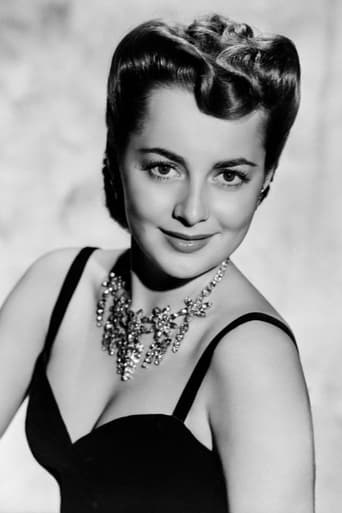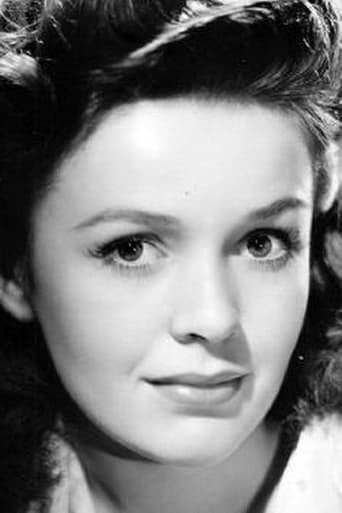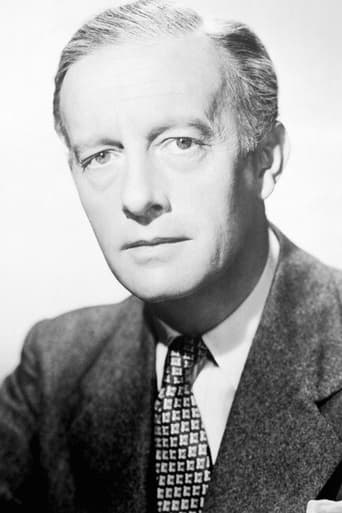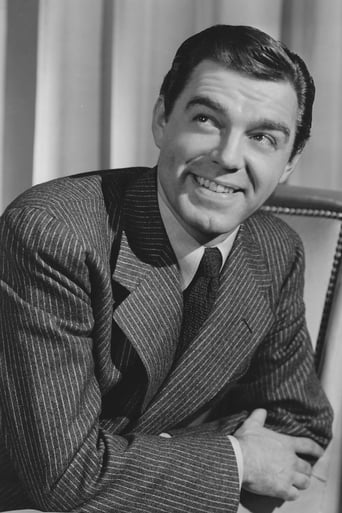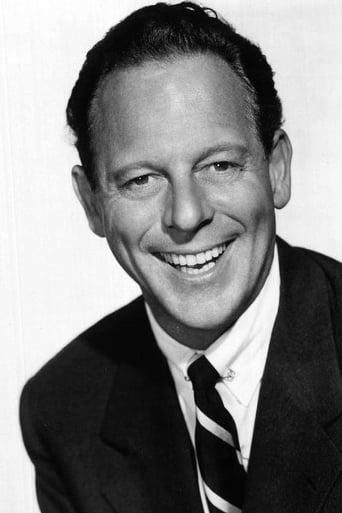Smartorhypo
Highly Overrated But Still Good
ShangLuda
Admirable film.
Lucia Ayala
It's simply great fun, a winsome film and an occasionally over-the-top luxury fantasy that never flags.
Scarlet
The film never slows down or bores, plunging from one harrowing sequence to the next.
bbmtwist
Yes, this is a very effective melodrama, and yes, de Havilland deserved her Oscar, not only for her sincere performance at every point in the life of the character, but for her totally believable aging from 18 to middle age. At each step of the way she "evolves" the character into the appropriate age. A triumph of technique and sincerity.Seemingly no one in the world between 1939 and 2015 has ever noted that Brackett, for all his "original story" Oscar nom, totally stole the plot from Edith Wharton. Her novel, OLD NEW YORK, was made up of a series of novellas covering representative New York society from the 1840s onward. One of these, titled THE OLD MAID, became a play and then a 1939 film, starring Bette Davis and Miriam Hopkins.THE OLD MAID introduced the Civil War to explain the demise of its leading lady's love and father of her illegitimate child, in this case a girl. In the novella, he was simply a playboy, off to Paris for art and she a NY fling.TO EACH HIS OWN moves the "war" up to WWI, changes the sex of the child, and then blatantly goes on to ape Wharton and the prior film. The only difference is that in THE OLD MAID, the character was against her daughter's marriage, while in TO EACH HIS OWN, she is very much "for" it.It galls me that people get praise for copying other's creations, as it does me hear with Brackett. Even more galling is the short-term memory loss of Academy members. Only 7 years passed between the two films. Surely someone in the writing departments of voters could remember the Wharton plot.Rent or buy both films and run them close to each other, enjoying the obvious similarities.
jotix100
We meet Jody Norris as she prepares for a night duty, as a volunteer,in war torn London during WWII. Her companion that evening is an outspoken man, who turns out to be Lord Desham, a well respected gentleman with the right connections. Jody, who has made a fortune in England, is paying back for the generosity she received while living there. At first, she is snippy with Desham, whom she does not care for as they meet. She becomes alive after Desham takes her for a drink and learns about the arrival of a train to Euston.While she waits, we get to know her story, which has not been a happy one. The son she had from a meeting with an Air Force ace, left her pregnant in a small town where the mere fact would have been quite a shock. The boy she delivers, by a strange set of coincidences, ends up with one of the town's richest girls. Jody's pilot lover, dying in combat, left her to fend for herself. Since she cannot have her son, she decides to go to New York to start a new life and becomes quite successful in a line of ladies' cosmetics with a friend. As the train arrives to Euston, one realizes she has waited for Gregory, the son that was taken away from her, who like his father, is involved in another war. Jody must do everything in her power to keep him for his stay in London, but she is not prepared for his plans to share his free time with the girl he wants to marry, who happens to be in the war. Finally, through Desham's intervention, Gregory realizes who this generous woman really is."To Each His Own" directed by Michael Leisen was one of the best melodramas from that era. Charles Brackett added another success to his great career in Hollywood with the screenplay he wrote with Jacques Thiery. It was an excellent combination for this inspired film that gave its star Olivia De Havilland her well deserved recognition in a role she made her own. The story reminded this viewer of that old biblical story of King Solomon and the two women claiming to be the rightful mother of an infant. The real mother renouncing to her right because she did not want the infant divided in two, relates to the sacrifice Jody Norris must make since everything conspired against her having her own son. In the end, she is rewarded when the son recognizes her love for him through the years.The well deserved award by Ms. De Havilland was a tribute to the way she created a character that was real as well as noble. The actress showed she had what it took to carry a picture with panache. John Lund is seen briefly as the father and the son in the life of Jody Norris. There are remarkable performances of players like Mary Anderson, Ronald Culver, Philip Terry, Bill Goodwin, and Victoria Horne, among others.Daniel Fapp, veteran of many films, contributed with his black and white cinematography. The music score by Victor Young reflected the times in which the action took place. Michael Leisen was inspired in his approach to the way he presented the story which deserves a view even as the picture is seldom seen these days.
filmsfan38
Olivia de Havilland won the Oscar for best actress in 1947 for "To Each his Own" a tearjerker, made in 1946. She was one of the great actresses of the day when movies were worth going to see. She made many good movies such as "Hush hush sweet Charlotte, Snake Pit are two good ones.They were released on DVD. But "To each his own is one of my personal favourites. 430 people on IMDb.com have rated this movie highly at 8/10 as of Sept./08, so why on earth has this good movie never been released on DVD. I am lucky to have it on video, but would rather have the DVD. In "To each His own", Olivia is Jody Norris, a small town girl working in her fathers store. She meets a handsome young air force pilot and they fall in love. He leaves to go to war and Olivia finds herself going to be a single mother. In those days young women were isolated and not supported when having a baby out of wedlock. Nothing like today. Olivia has a lot of heartache to go through, has the baby but faces further heartbreak. Her life moves on after she has the baby, who she was not able to keep, but I won't say any more. Get a hanky out for the ending. Studios, one of you need to get this movie out on DVD. If you can release a lot of junky movies on DVD, you can release this good classic on DVD. It would sell well. I'm tired waiting and getting older by the day. I've got about 100 good DVD movies, and need the DVD of this one as soon as possible.
theowinthrop
TO EACH HIS OWN is in that category of woman's films dealing with a mother who loses her child for social or economic reasons. So it is in the same group as MADAME X (in all it's versions) or STELLA DALLAS. But it is little better than a superior weeper. Mitchell Leisin was a director with taste and ability, frequently given run-of-the-mill assignments, and sometimes given important films that were taken from him and mangled (LADY IN THE DARK). But when given a sensible property like EASY LIVING or HOLD BACK THE DAWN he turned in one really good result of a film.In 1941 Leisin had directed Olivia De Haviland in HOLD BACK THE DAWN, a film about European immigrants in a Mexican/American border town like Tijuana, who were hoping to figure out how to finally achieve permission to come into the U.S. and become citizens. De Haviland played an American school teacher who is swept off her feet by a calculating gigolo (Charles Boyer) and ends marrying him (which is how he plans to become an American citizen). Her performance was well done, and she got nominated for the Best Actress Oscar of that year. Unfortunately, her sister Joan Fontaine was also nominated for SUSPICION.Fontaine was on a personal high at that time, as she had been the star of Hitchcock's film REBECCA the year before, and now that great director directed her in this second film. The news media built up the rivalry between the two sisters, probably out of nothing in particular. As it turned out, the result was good for Fontaine but bad for De Haviland. And a breach apparently did develop between the sisters (if it had not been there before).But in 1946 Leisin got a second chance to direct De Haviland. Here she was Jody Norris, the daughter of a pharmacist in a New York State small town. In 1917 her town is visited by a pilot (John Lund) who is on a bond selling tour for the war effort. Lund and De Haviland hit it off in the brief time they are together, and have a very passionate love affair. But he has to return to the front. He leaves and she soon finds she is pregnant. Then she hears he is killed in the war. De Haviland decides (with the advice of her father) to have the baby away from the town, and then to arrange for it to be deposited on the doorstep of a poor family who have too many children. Her intention is to come by with her father, find the family can't afford to have another baby to feed, and offer to adopt the baby so they can avoid a scandal and keep the child.Unfortunately the best laid schemes fall apart - De Haviland's rival, a wealthy snob (Mary Anderson) had married one of De Haviland's boyfriends (Philip Terry) but had lost their child. Terry hears about the foundling, and beats De Haviland and her father to the poor family's house. He and Anderson adopt the baby. And De Haviland's sad heartbreak begins. She can't (as her wise father - Griff Barnett - points out) make a scene about her rights to adopt the foundling without making everyone aware that she must be the mother. If she does it will bring shame down on the baby boy.In the course of the film, De Haviland tries, over the years, to remain as close as possible to the baby as she can. Unfotunately Anderson keeps thinking that Terry is actually keeping sexual relations with De Haviland. Soon she is forbidden the house. Later she tries economic pressures, but with even less success - the baby has grown into the loyal little son of Anderson, and rebels against De Haviland's encroachment.The script of Charles Brackett & Jacques Thery allows De Haviland to show more than heartbreak. She has been her father's assistant in the drugstore, and she puts this to use in building up a cosmetic empire (like Helena Rubenstein's). Also Anderson and Terry face financial problems, as Anderson's father manufactured player pianos - which are going out of favor in the depression. This briefly gives De Haviland her financial pressure on them to try to take Gregory ("Griggsy") - her son - back. And it does not work.Still, De Haviland keeps tabs on her son. She has moved to England as she got wealthier, and the surrounding framework of the film shows her as a fire-watcher with a nobleman, Lord Desham (Roland Culver). They narrowly have a fatal accident, and when they are together having dinner we learn the story - and that she has a chance (she thinks) of seeing her son again before he is shipped to the front. Will she see him or not? De Haviland's role gave her scope to show heartbreak and to show sense and to show overreaching. It was a marvelous part. Leisin's direction gave her every opportunity, and he brought out the best in the supporting cast - and the over-the-years review of events like the rise of women in business, prohibition, the Depression, and the Wars helped the film too. De Haviland got nominated for an Oscar for best actress for TO EACH HIS OWN in 1946 - and this time she won. She would repeat her success in a few years with THE HEIRESS as well.
